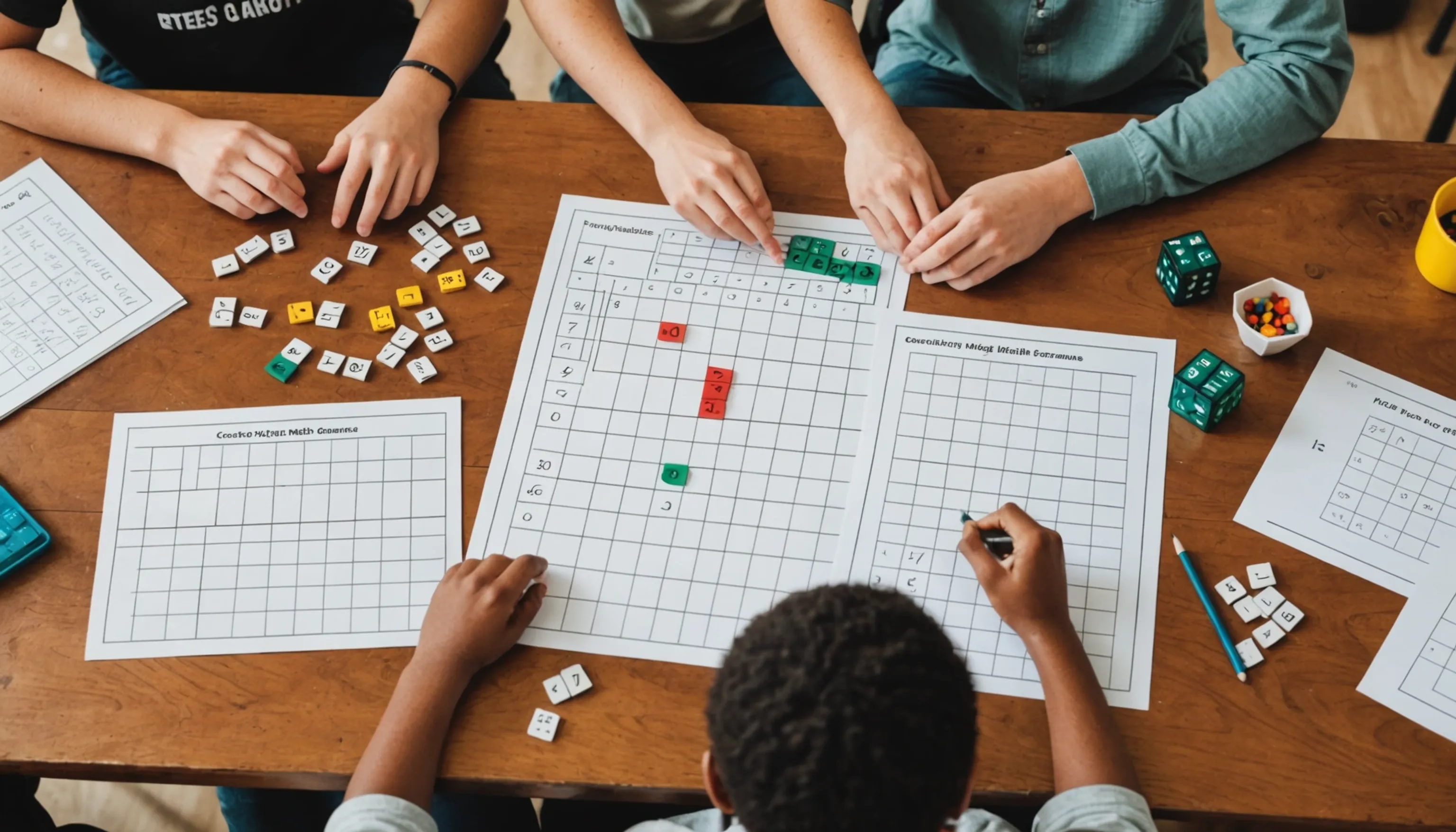Challenging Free Math Games
 HvWHenry van Wagenberg
HvWHenry van Wagenberg
Challenging Math Games for Free
Challenging math games for free offer an engaging way for teenagers to enhance their math skills while having fun. These games are not only entertaining but also help in reinforcing critical math concepts. They can range from online platforms to printable worksheets, making them accessible for both home and classroom use.
Many websites provide free resources that cater to various math levels, ensuring that teenagers can find the right challenge. By incorporating these games into study routines, parents and teachers can motivate teens to improve their math proficiency in an enjoyable way.
Benefits of Math Games for Teenagers
Math games provide numerous benefits for teenagers, making learning enjoyable and effective. First and foremost, these games enhance mathematical understanding by allowing students to practice concepts in a low-pressure environment. When teenagers engage with math through games, they are more likely to retain information and apply it to real-world situations.
Additionally, math games encourage critical thinking and problem-solving skills. As teenagers tackle various challenges, they learn to analyze problems and devise strategies to solve them. This not only helps in math but also builds skills applicable in other academic subjects and everyday life.
Another significant advantage is the boost in motivation and engagement. Traditional learning methods can sometimes feel tedious, but incorporating games transforms math into an enjoyable experience. This increased motivation can lead to improved academic performance and a more positive attitude towards math overall.
Furthermore, math games can foster collaboration and social skills. Many games require teamwork, encouraging teenagers to communicate effectively and work together to achieve a common goal. This aspect is particularly beneficial in classroom settings, where students can learn from each other and develop a sense of camaraderie.
Lastly, math games can be easily integrated into both home and classroom environments. Parents and teachers can utilize various free resources available online or create their own games, ensuring that learning remains fun and accessible for all teenagers. By incorporating math games into learning routines, we set the stage for a brighter mathematical future.
Top Free Online Math Games
When it comes to top free online math games, there are several excellent platforms that cater to teenagers' diverse learning needs. One popular option is Khan Academy, which offers a wide range of interactive math exercises that adapt to each student's level. This personalized approach encourages students to progress at their own pace.
Another fantastic resource is Prodigy Math, an engaging game that combines math practice with an adventurous storyline. Players solve math problems to progress through different levels, making learning feel like an exciting quest.
Math Playground is also noteworthy, providing a variety of games that focus on different math skills, including logic puzzles and word problems. These games are not only entertaining but also help reinforce essential math concepts.
By utilizing these free online resources, teenagers can enhance their math skills while having fun!

Khan Academy
Khan Academy is a premier online educational platform that provides a plethora of free resources, particularly in the realm of mathematics. Designed for learners of all ages, it offers an extensive collection of interactive exercises, instructional videos, and personalized learning dashboards. This makes it an ideal choice for teenagers looking to strengthen their math skills.
One of the standout features of Khan Academy is its adaptive learning technology, which tailors the content to match each student's unique learning pace. As students engage with the material, the platform assesses their performance and adjusts the difficulty level accordingly. This personalized approach ensures that teenagers remain challenged without feeling overwhelmed.
Khan Academy covers a wide range of topics, from basic arithmetic to advanced calculus and statistics. Each topic is broken down into manageable sections, allowing students to focus on specific areas where they may need improvement. Additionally, the platform provides practice problems and instant feedback, empowering students to learn from their mistakes.
The platform also encourages a growth mindset by celebrating small victories and milestones. Teenagers can track their progress over time, which fosters motivation and a sense of accomplishment. Overall, Khan Academy is an invaluable resource for any teenager seeking to improve their math skills while enjoying a flexible and engaging learning experience.
Prodigy Math
Prodigy Math is an innovative online platform designed to make math learning fun and interactive for teenagers. It combines educational content with engaging gameplay, allowing students to practice math skills in a dynamic environment. The game is structured like an adventure, where players create their own characters and embark on quests while solving math problems to progress.
One of the key features of Prodigy Math is its curriculum-aligned content, which covers a wide range of topics including arithmetic, algebra, geometry, and more. This ensures that students are practicing relevant material that aligns with their school curriculum. As players navigate through various challenges, they encounter math questions that adapt to their skill level, offering a personalized learning experience.
The platform also incorporates elements of gamification, such as rewards and achievements, which keep students motivated and engaged. As they solve problems, players earn coins to purchase in-game items and level up their characters, making the learning process enjoyable.
Furthermore, Prodigy Math provides teachers and parents with valuable insights through progress reports, allowing them to track students' performance and identify areas that need improvement. This feature facilitates better communication between students and their educators, enhancing the overall learning experience. Overall, Prodigy Math is a fantastic tool for teenagers looking to sharpen their math skills while enjoying an immersive gaming experience.
Math Playground
Math Playground is a fantastic online resource that offers a wide variety of math games and activities designed to engage teenagers in learning. This platform covers a range of mathematical concepts, making it suitable for different skill levels. Here are some key features that make Math Playground an excellent choice for students:
- Diverse Game Selection: Math Playground provides numerous games that focus on various math skills, including:
- Arithmetic
- Geometry
- Fractions
- Word problems
- Interactive Learning: The games are designed to be interactive and enjoyable, encouraging teenagers to practice math in a fun way.
- Problem-Solving Skills: Many games require critical thinking and strategy, helping students develop essential problem-solving skills.
- Accessible Resources: The platform is user-friendly and easily accessible, making it simple for teenagers to navigate and find suitable games.
Additionally, Math Playground offers math videos and puzzles that further enhance the learning experience. These resources provide explanations of complex concepts in an easy-to-understand format.
Teachers and parents can also benefit from Math Playground, as it allows them to monitor students' progress and identify areas where they may need extra practice. By incorporating Math Playground into their study routine, teenagers can improve their math skills while enjoying an engaging and interactive learning environment.

Printable Math Games for Home and Classroom
Printable math games are excellent resources for both home and classroom settings, providing a fun way for teenagers to practice their math skills. These games can include worksheets, puzzles, and board games that require minimal preparation and materials. By using printable resources, students can enjoy a hands-on learning experience, reinforcing concepts such as addition, subtraction, multiplication, and division.
Many websites offer free downloadable math games that cater to different skill levels. These games encourage collaboration and competition, making math practice engaging and effective for all learners.
Math Puzzles and Riddles
Math puzzles and riddles are fantastic tools for enhancing critical thinking and problem-solving skills among teenagers. These brain teasers not only make math enjoyable but also challenge students to think outside the box. By incorporating puzzles into their study routines, teenagers can develop a deeper understanding of mathematical concepts while having fun.
There are various types of math puzzles that cater to different skill levels and interests. Some popular categories include:
- Logic Puzzles: These require deductive reasoning and often involve sequences, patterns, or strategic thinking.
- Number Puzzles: These challenges focus on numerical relationships and operations, helping students practice their arithmetic skills.
- Geometry Puzzles: These puzzles involve shapes and spatial reasoning, encouraging students to explore geometric concepts in an engaging way.
Riddles also play a significant role in math learning. They promote lateral thinking and often require students to approach problems from different angles. For example, a riddle might ask students to determine the age of a character based on a set of clues, integrating math with critical reasoning.
Many websites and educational resources offer collections of math puzzles and riddles tailored for teenagers. Incorporating these activities into math lessons can enhance engagement, foster a love for mathematics, and help students develop essential skills that will benefit them in their academic journey and beyond.
Card and Dice Games
Card and dice games are excellent tools for teaching math concepts to teenagers in a fun and interactive way. These games not only promote engagement but also help students develop essential skills such as critical thinking, strategy, and basic arithmetic. By incorporating these games into lessons or at home, teenagers can practice their math skills while enjoying quality time with friends and family.
One popular card game is Math War, where players use a standard deck of cards to compare values. Each player flips two cards, and the one with the higher total wins the round. Variations of this game can be created by adding operations like addition, subtraction, or multiplication to increase the difficulty.
Dice games also offer versatile math practice. For example, Dice Addition involves rolling two dice and adding the numbers together. Players can keep track of their scores, reinforcing addition skills in a competitive format. Another engaging option is Yahtzee, which combines luck and strategy while requiring players to calculate scores based on combinations of rolled dice.
These games can be easily adapted for different skill levels and can be played in groups or individually. Furthermore, they foster a sense of camaraderie and collaboration among peers, making math a more enjoyable subject. By using card and dice games, teenagers can enhance their math skills while having fun and building lasting memories.
Board Games with Math Elements
Board games with math elements are a fantastic way to make mathematics enjoyable for teenagers while fostering social interaction and strategic thinking. These games often incorporate math concepts such as counting, probability, and basic operations, allowing players to practice their skills in a fun and engaging environment.
One popular board game is Monopoly, which teaches players about money management and basic arithmetic. As players buy properties, calculate rent, and trade resources, they reinforce their understanding of addition, subtraction, and financial literacy. The game's competitive nature also encourages strategic planning and decision-making.
Another great example is Math Bingo, where players fill out bingo cards with answers to math problems. This game not only reinforces various math concepts but also promotes quick thinking and improves mental math skills.
Set is a unique card game that focuses on pattern recognition, requiring players to identify sets of three cards based on specific attributes. While it may not seem like a traditional math game, it develops logical reasoning and spatial awareness, which are essential skills in mathematics.
Incorporating board games with math elements into learning can make the subject more relatable and enjoyable for teenagers. These games encourage collaboration, communication, and critical thinking, all while reinforcing fundamental math concepts. By engaging with these games, students can build a positive attitude toward math, paving the way for success in their academic journey.
